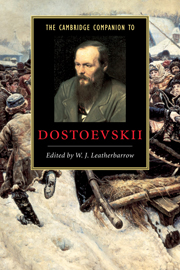Book contents
- Frontmatter
- 1 Introduction
- 2 Dostoevskii and the Russian folk heritage
- 3 Dostoevskii and literature
- 4 Dostoevskii as a professional writer
- 5 Dostoevskii and money
- 6 Dostoevskii and the intelligentsia
- 7 Dostoevskii and psychology
- 8 Dostoevskii and religion
- 9 Dostoevskii and the family
- 10 Dostoevskii and science
- 11 Conclusion
- Further reading
- Index
4 - Dostoevskii as a professional writer
Published online by Cambridge University Press: 28 May 2006
- Frontmatter
- 1 Introduction
- 2 Dostoevskii and the Russian folk heritage
- 3 Dostoevskii and literature
- 4 Dostoevskii as a professional writer
- 5 Dostoevskii and money
- 6 Dostoevskii and the intelligentsia
- 7 Dostoevskii and psychology
- 8 Dostoevskii and religion
- 9 Dostoevskii and the family
- 10 Dostoevskii and science
- 11 Conclusion
- Further reading
- Index
Summary
Dostoevskii marks a turning point in his career as a fiction writer when he begins to endow his literary characters with sufficient funds to go about their daily lives, as he had not done in his first novel Poor Folk, and when he makes economic security a secondary concern for his heroes, as, for instance, in The Double and Notes from Underground. In the fictions for which he is best remembered, plots do not turn fundamentally on sudden financial reversals (e.g. the discovery of a will, a bankruptcy, a windfall profit); moral, ideological and psychological problems haunt the principal characters more than financial ones. The youthful Dostoevskii's concern with the crushing effects of environment yielded – but not entirely – in his mature work to penetrating investigations of free will and moral responsibility. The prominence of these issues in Dostoevskii's fictions earned him the authorial image of a philosophical novelist, a profound psychologist, even a religious prophet.
Only in recent decades have scholars begun to rediscover what Dostoevskii ’s contemporary readers and fellow writers knew well, that he was a thoroughly professional writer in all senses of the word ‘professional ’, seriously engaged throughout his post-exile career with contemporary media, audiences, and institutional possibilities, rarely able (unlike many of his characters) to ignore financial problems and issues of professional status. He experienced all that Russian literary life offered, from imprisonment, censorship and heavy indebtedness to fame, influence and relative prosperity. His professional activities spanned fiction writing, criticism, journalism, editing, publishing and a responsible post in Russia’s first association of writers.
- Type
- Chapter
- Information
- The Cambridge Companion to Dostoevskii , pp. 66 - 92Publisher: Cambridge University PressPrint publication year: 2002
- 1
- Cited by



